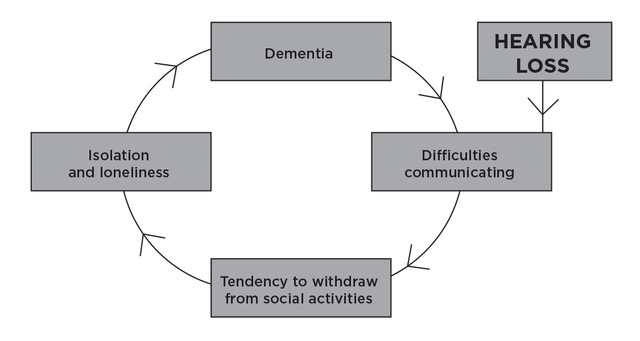
What if it were possible to reduce the risk of dementia…
Hearing aids may have a key role in preventing dementia. Indeed, people with hearing loss who do not wear hearing aids have a greater risk of developing a dementia, compared to those who use hearing aids.
A study also showed that the cognitive decline of people at high risk of dementia after 3 years of wearing hearing aids was almost 50% less than for the same type of people who didn’t use hearing aids.
Common difficulties caused by deafness and dementia
Hearing loss is one of the most common chronic health problems among older adults. Difficulty communicating, particularly in noisy places, during a telephone conversation or in a group, can cause the person with hearing loss to withdraw from social activities, experience isolation and thus increase the risk of suffering from dementia.

Dementia is caused, among other things, by diseases such as Alzheimer’s that provoke damage to the brain and deteriorate the person’s ability to process their thoughts, in a more accelerated manner than is generally expected with aging. It may therefore be more difficult for the person with dementia to follow conversations or retain information and recent events. This is why certain difficulties can be associated with both hearing loss and dementia.
So how can you tell the difference between hearing loss and dementia?
First of all, the audiological evaluation makes it possible to identify hearing loss and establish different solutions to correct it. Hearing correction, particularly through the use of hearing aids, aims to limit communication difficulties as well as promote social integration. While hearing properly again, the person can restart to participate in activities and have new social interactions. The brain is better stimulated and can maintain its daily functions.
Once the hearing loss has been adequately treated with hearing aids, the person can then have their cognitive abilities assessed by a doctor, neurologist or geriatrician. Thanks to the use of his hearing aids, performance on various cognitive tests will not be negatively affected by his hearing loss and a clear portrait of his cognitive health can be established.
This is why it is important to evaluate your hearing at the first signs of hearing loss, especially before carrying out cognitive tests for dementia.
If you have any doubts about your hearing or that of a loved one, do not hesitate to consult an audiologist.
















